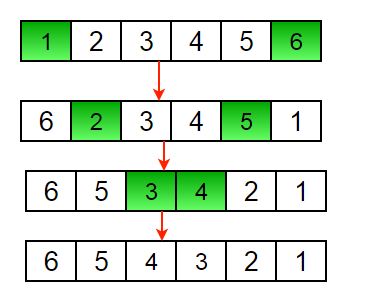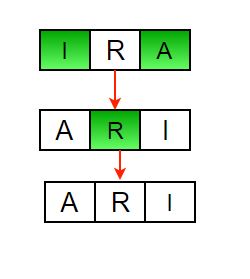Dada una array (o string), la tarea es invertir la array/string.
Ejemplos:
Input : arr[] = {1, 2, 3}
Output : arr[] = {3, 2, 1}
Input : arr[] = {4, 5, 1, 2}
Output : arr[] = {2, 1, 5, 4}
forma iterativa:
1) Inicialice los índices de inicio y fin como inicio = 0, fin = n-1
2) En un ciclo, intercambie arr[inicio] con arr[fin] y cambie inicio y fin de la siguiente manera:
inicio = inicio +1, fin = fin – 1

Otro ejemplo para invertir una string:

A continuación se muestra la implementación del enfoque anterior:
C++
// Iterative C++ program to reverse an array
#include <bits/stdc++.h>
using namespace std;
/* Function to reverse arr[] from start to end*/
void rvereseArray(int arr[], int start, int end)
{
while (start < end)
{
int temp = arr[start];
arr[start] = arr[end];
arr[end] = temp;
start++;
end--;
}
}
/* Utility function to print an array */
void printArray(int arr[], int size)
{
for (int i = 0; i < size; i++)
cout << arr[i] << " ";
cout << endl;
}
/* Driver function to test above functions */
int main()
{
int arr[] = {1, 2, 3, 4, 5, 6};
int n = sizeof(arr) / sizeof(arr[0]);
// To print original array
printArray(arr, n);
// Function calling
rvereseArray(arr, 0, n-1);
cout << "Reversed array is" << endl;
// To print the Reversed array
printArray(arr, n);
return 0;
}
C
// Iterative C program to reverse an array
#include<stdio.h>
/* Function to reverse arr[] from start to end*/
void rvereseArray(int arr[], int start, int end)
{
int temp;
while (start < end)
{
temp = arr[start];
arr[start] = arr[end];
arr[end] = temp;
start++;
end--;
}
}
/* Utility that prints out an array on a line */
void printArray(int arr[], int size)
{
int i;
for (i=0; i < size; i++)
printf("%d ", arr[i]);
printf("\n");
}
/* Driver function to test above functions */
int main()
{
int arr[] = {1, 2, 3, 4, 5, 6};
int n = sizeof(arr) / sizeof(arr[0]);
printArray(arr, n);
rvereseArray(arr, 0, n-1);
printf("Reversed array is \n");
printArray(arr, n);
return 0;
}
Java
// Iterative java program to reverse an
// array
public class GFG {
/* Function to reverse arr[] from
start to end*/
static void rvereseArray(int arr[],
int start, int end)
{
int temp;
while (start < end)
{
temp = arr[start];
arr[start] = arr[end];
arr[end] = temp;
start++;
end--;
}
}
/* Utility that prints out an
array on a line */
static void printArray(int arr[],
int size)
{
for (int i = 0; i < size; i++)
System.out.print(arr[i] + " ");
System.out.println();
}
// Driver code
public static void main(String args[]) {
int arr[] = {1, 2, 3, 4, 5, 6};
printArray(arr, 6);
rvereseArray(arr, 0, 5);
System.out.print("Reversed array is \n");
printArray(arr, 6);
}
}
// This code is contributed by Sam007
Python
# Iterative python program to reverse an array
# Function to reverse A[] from start to end
def reverseList(A, start, end):
while start < end:
A[start], A[end] = A[end], A[start]
start += 1
end -= 1
# Driver function to test above function
A = [1, 2, 3, 4, 5, 6]
print(A)
reverseList(A, 0, 5)
print("Reversed list is")
print(A)
# This program is contributed by Pratik Chhajer
C#
// Iterative C# program to reverse an
// array
using System;
class GFG {
/* Function to reverse arr[] from
start to end*/
static void rvereseArray(int []arr,
int start, int end)
{
int temp;
while (start < end)
{
temp = arr[start];
arr[start] = arr[end];
arr[end] = temp;
start++;
end--;
}
}
/* Utility that prints out an
array on a line */
static void printArray(int []arr,
int size)
{
for (int i = 0; i < size; i++)
Console.Write(arr[i] + " ");
Console.WriteLine();
}
// Driver function
public static void Main()
{
int []arr = {1, 2, 3, 4, 5, 6};
printArray(arr, 6);
rvereseArray(arr, 0, 5);
Console.Write("Reversed array is \n");
printArray(arr, 6);
}
}
// This code is contributed by Sam007
PHP
<?php
// Iterative PHP program
// to reverse an array
/* Function to reverse
$arr from start to end*/
function rvereseArray(&$arr, $start,
$end)
{
while ($start < $end)
{
$temp = $arr[$start];
$arr[$start] = $arr[$end];
$arr[$end] = $temp;
$start++;
$end--;
}
}
/* Utility function to
print an array */
function printArray(&$arr, $size)
{
for ($i = 0; $i < $size; $i++)
echo $arr[$i] . " ";
echo "\n";
}
// Driver code
$arr = array(1, 2, 3, 4, 5, 6);
// To print original array
printArray($arr, 6);
// Function calling
rvereseArray($arr, 0, 5);
echo "Reversed array is" ."\n";
// To print the Reversed array
printArray($arr, 6);
// This code is contributed
// by ChitraNayal
?>
Producción :
1 2 3 4 5 6 Reversed array is 6 5 4 3 2 1
Complejidad temporal: O(n)
Vía recursiva:
1) Inicialice los índices de inicio y fin como inicio = 0, fin = n-1
2) Intercambie arr[inicio] con arr[fin]
3) Invoque de forma recursiva reverse para el resto de la array.
A continuación se muestra la implementación del enfoque anterior:
C++
// Recursive C++ program to reverse an array
#include <bits/stdc++.h>
using namespace std;
/* Function to reverse arr[] from start to end*/
void rvereseArray(int arr[], int start, int end)
{
if (start >= end)
return;
int temp = arr[start];
arr[start] = arr[end];
arr[end] = temp;
// Recursive Function calling
rvereseArray(arr, start + 1, end - 1);
}
/* Utility function to print an array */
void printArray(int arr[], int size)
{
for (int i = 0; i < size; i++)
cout << arr[i] << " ";
cout << endl;
}
/* Driver function to test above functions */
int main()
{
int arr[] = {1, 2, 3, 4, 5, 6};
// To print original array
printArray(arr, 6);
// Function calling
rvereseArray(arr, 0, 5);
cout << "Reversed array is" << endl;
// To print the Reversed array
printArray(arr, 6);
return 0;
}
C
// Recursive C program to reverse an array
#include <stdio.h>
/* Function to reverse arr[] from start to end*/
void rvereseArray(int arr[], int start, int end)
{
int temp;
if (start >= end)
return;
temp = arr[start];
arr[start] = arr[end];
arr[end] = temp;
rvereseArray(arr, start+1, end-1);
}
/* Utility that prints out an array on a line */
void printArray(int arr[], int size)
{
int i;
for (i=0; i < size; i++)
printf("%d ", arr[i]);
printf("\n");
}
/* Driver function to test above functions */
int main()
{
int arr[] = {1, 2, 3, 4, 5, 6};
printArray(arr, 6);
rvereseArray(arr, 0, 5);
printf("Reversed array is \n");
printArray(arr, 6);
return 0;
}
Java
// Recursive Java Program to reverse an array
import java.io.*;
class ReverseArray {
/* Function to reverse arr[] from start to end*/
static void rvereseArray(int arr[], int start, int end)
{
int temp;
if (start >= end)
return;
temp = arr[start];
arr[start] = arr[end];
arr[end] = temp;
rvereseArray(arr, start+1, end-1);
}
/* Utility that prints out an array on a line */
static void printArray(int arr[], int size)
{
for (int i=0; i < size; i++)
System.out.print(arr[i] + " ");
System.out.println("");
}
/*Driver function to check for above functions*/
public static void main (String[] args) {
int arr[] = {1, 2, 3, 4, 5, 6};
printArray(arr, 6);
rvereseArray(arr, 0, 5);
System.out.println("Reversed array is ");
printArray(arr, 6);
}
}
/*This article is contributed by Devesh Agrawal*/
Python
# Recursive python program to reverse an array
# Function to reverse A[] from start to end
def reverseList(A, start, end):
if start >= end:
return
A[start], A[end] = A[end], A[start]
reverseList(A, start+1, end-1)
# Driver function to test above function
A = [1, 2, 3, 4, 5, 6]
print(A)
reverseList(A, 0, 5)
print("Reversed list is")
print(A)
# This program is contributed by Pratik Chhajer
C#
// C# program to reverse an array
using System;
class GFG
{
/* Function to reverse arr[]
from start to end*/
static void rvereseArray(int []arr, int start,
int end)
{
int temp;
if (start >= end)
return;
temp = arr[start];
arr[start] = arr[end];
arr[end] = temp;
rvereseArray(arr, start+1, end-1);
}
/* Utility that prints out an
array on a line */
static void printArray(int []arr, int size)
{
for (int i = 0; i < size; i++)
Console.Write(arr[i] + " ");
Console.WriteLine("");
}
// Driver Code
public static void Main ()
{
int []arr = {1, 2, 3, 4, 5, 6};
printArray(arr, 6);
rvereseArray(arr, 0, 5);
Console.WriteLine("Reversed array is ");
printArray(arr, 6);
}
}
// This code is contributed by Sam007
PHP
<?php
// Iterative PHP program
// to reverse an array
/* Function to reverse
$arr from start to end*/
function rvereseArray(&$arr,
$start, $end)
{
if ($start >= $end)
return;
$temp = $arr[$start];
$arr[$start] = $arr[$end];
$arr[$end] = $temp;
//Recursive Function calling
rvereseArray($arr, $start + 1,
$end - 1);
}
/* Utility function
to print an array */
function printArray(&$arr, $size)
{
for ($i = 0; $i < $size; $i++)
echo $arr[$i] . " ";
echo "\n";
}
// Driver code
$arr = array(1, 2, 3, 4, 5, 6);
// To print original array
printArray($arr, 6);
// Function calling
rvereseArray($arr, 0, 5);
echo "Reversed array is" ."\n";
// To print the Reversed array
printArray($arr, 6);
// This code is contributed
// by ChitraNayal
?>
Producción :
1 2 3 4 5 6 Reversed array is 6 5 4 3 2 1
Complejidad de tiempo : O(n)
Otro enfoque: usar el corte de listas de Python
Python3
def reverseList(A):
print( A[::-1])
# Driver function to test above function
A = [1, 2, 3, 4, 5, 6]
print(A)
print("Reversed list is")
reverseList(A)
Producción:
[1, 2, 3, 4, 5, 6] Reversed list is [6, 5, 4, 3, 2, 1]
Escriba comentarios si encuentra algún error en los programas anteriores u otras formas de resolver el mismo problema.
Publicación traducida automáticamente
Artículo escrito por GeeksforGeeks-1 y traducido por Barcelona Geeks. The original can be accessed here. Licence: CCBY-SA